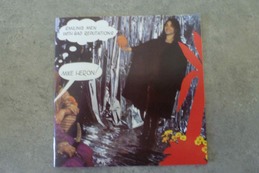Monday, 29 April 2013

Looking back on the British music scene in the late sixties from the cold hard light of twenty-first century reality there are a couple of things that tend to leave a definite impression. One of them, in an era where some major acts struggle to produce an album every couple of years is the sheer volume of music bands were able to churn out back then.
Quantity, of course, doesn’t always equate to quality, but in the hot house scene that operated then anyone who wasn’t delivering quality product that could be moved tended to vanish into oblivion fairly quickly.
In terms of quantity most acts would have been pushing to match the volume of releases the Incredible String Band rolled out between 1966 (The Incredible String Band) and 1974’s Hard Rope and Silken Twine. There’s a full dozen titles, two of them double albums in that nine year span, and that’s without Mike Heron’s Smiling Men with Bad Reputations (released in 1971) and Robin Williamson’s Myrrh (1972).
Prolific seems rather close to understatement, and the quality was pretty good as well.
Unlike Williamson, who’d started the ISB with fellow folkie Clive Palmer, Heron had been a rocker, something that’s obvious from the beginning of the quite boppy Call Me Diamond, with squealing sax from South African avant-gardist Dudu Pukwana and decidedly rocky piano from Heron himself. Decidedly non-Stringy, but mighty fine fun. Flowers of the Forest sits in more familiar territory for ISB fans, though it’s somewhat rockier than his work in that setting with Richard Thompson’s electric guitar running through the ramble.
There’s something that sounds remarkably like a harpsichord in the introduction to Audrey, which is heading back towards ISB territory with a trace of A Very Cellular Song in the harmonium while he’s expressing a desire (or an intention) to take your clothes off.
Brindaban evokes Hindu mythology, in particular legends involving Krishna and the milkmaids in the town of Vrindavan over an evocative string arrangement, while Feast of Stephen works Cat Stevens territory quite magnificently. A great song that’s on a par with almost anything he managed with the ISB and finishes well ahead of most of the pack. Spirit Beautiful is much more obviously Indian in inspiration, with tabla tapping away and the veena and tambura droning away in the background, a swooping, swirling chorus that includes the members of Dr Strangely Strange and a Very Cellular jaw harp in the instrumental play-out.
By contrast, with instrumental accompaniment from Tommy and the Bijoux (Pete Townshend, Ronnie Lane and Keith Moon) Warm Heart Pastry heads straight towards full-blown heavy rock. In the end it mightn’t quite get there, but it winds up in a reasonably adjacent postcode as Moon flails away and Townshend’s guitar picks its way through an intricate little riff.
There’s a synthesiser lead into Beautiful Stranger, where a (presumably, it’s got that sort of tropical island vibe) native beauty looks after a wounded traveller, soldier or sailor coming out of a fever over an instrumental track that’s rather muddled and cluttered and the album proper ends with an intimate No Turning Back with sparse acoustic guitar and a mysterious lyric that might involve a premature departure from a loved one delivered in a hesitant manner.
The album reappeared in 2004, remastered with two bonus tracks, an uptempo Make No Mistake and the decidedly rocky Lady Wonder that combine to take the remastered version out with a bang rather than a low key semi-whimper and point towards the increasingly rock orientation to come on the later Incredible String Band albums.
All in all, a fairly eclectic collection of material that probably wouldn’t have fitted into the earlier incarnations of the ISB and breaks new ground, largely due to John Cale’s brass and vocal arrangements and the extra tonalities he delivers on viola, harmonium, piano, and bass. Maybe not essential, but definitely interesting.